8a unit4 reading2
牛津译林版八年级上 8A Unit4 知识点梳理

牛津译林版八年级上 8A Unit4 知识点梳理1. 单词和词组- celebrate: 庆祝- holiday: 假日- custom: 俗- traditional: 传统的- global: 全球的- cultural: 文化的- occasion: 场合- decorate: 装饰- feast: 盛宴- exchange: 交换- gift: 礼物- lantern: 灯笼- reunion: 团聚- special: 特别的- occasion: 场合- parade: 游行- costume: 服装- harvest: 收获- thankful: 感激的- journey: 旅程- ancestor: 祖先- symbol: 象征2. 主要知识点- 介词短语的用法:介词短语用来修饰名词或代词,并且说明其动作发生的位置、时间、原因、方式等。
例如:on Christmas Day (在圣诞节)、in the morning(在早上)。
- 同义词替换:通过使用同义词来丰富文本内容,使表达更加生动有趣。
例如:celebrate(庆祝)可以替换为mark、observe等。
- 词汇搭配:学好词汇的正确搭配是语言表达流利的重要部分。
例如:exchange gifts(交换礼物)、decorate the house(装饰房子)。
- 文化俗与传统节日:了解不同国家和地区的文化俗和传统节日可以丰富自己的视野,增加对多元文化的理解和尊重。
3. 例句- We celebrate Christmas with our family every year.- Lantern Festival is a traditional Chinese festival.- People usually exchange gifts during the Spring Festival.- Thanksgiving is a holiday when people express their gratitude.- The Mid-Autumn Festival is a time for family reunions.4. 补充材料- 了解不同文化与传统节日的俗,可以通过阅读相关的书籍、观看纪录片和参加文化活动等途径来深入了解和体验。
江阴市南闸实验学校牛津译林版八年级英语上册8A Unit4《Do it yourself》Reading课件(共22张PPT) (2)

1. Jim, _____ me a hand. A. gives B. is giving C. will give D. give 2. ____ careful, Jenny! There is a tree in front of you. A. Am B. / C. Be D. Was 3. Let's ____ our time. A. not waste B. no wasting C. not to waste D. no waste 4. —____ higher, and you will see the house. —OK. A. If you stand B. To stand C. When you stand D. Stand
brush, tape, scissors, glue, rope power brighter
course
Advice from Suzy
take a (7) __ in DIY
Tips for making a fruit salad
•(8) _____ your favourite fruit. •Wash the fruit. Mix •(9) ________ them together. •Cut the larger fruit into small pieces. Make/Prepare •(10) _________ the fruit salad before eating it.
Be quiet in class. should You ____ be quiet in class. had better You ___ ___ be quiet in clas.
Don’t play with the dog. had btter She____ ___ not ___play with the dog. should not play with the dog. She____ ___
8A Unit 4 Wild animals(Reading)
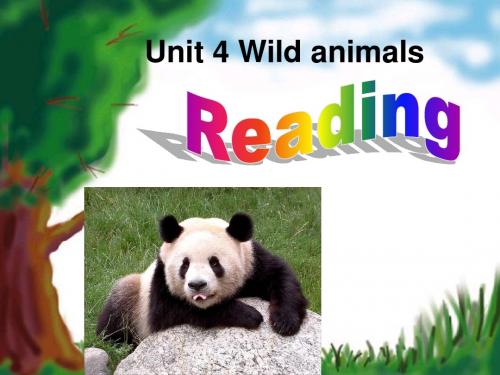
f
a
Suppose (假设)you are Xi Wang, say something about yourself, including(包括) your growth and problems you have.
at birth 100 grams
10 days Like a white mouse
What does it look like?
fur
thick
a baby panda
a giant panda
It looks like a bear, but with black and white fur.
grow into
It looks like a white mouse.
What does it eat ?
4 months 10 kg, go outside
6 months
12 months
20 months
Stop drinking…
Start to eat…
35kg, not…any more, grow into
Look after herself, because…
Why is Xi Wang crying?
It is the largest animal on land and its nose is very long.
elephant
It is small and lovely, but has a long tail. It likes nuts(坚果).
squirrel
Fill in the blanks. Foxes are clever and cunning. 1______ and eats insects, smaller animals. camel has three eyelids and can live without 2 A ______ water for a long time in the desert. tortoise can live up to 150 years old. 3 A _______ polar bear lives in the North Pole. It likes 4 A _______ eating fish. 5 Wolves _____ have very good eyesight,hearing and smell.
英语牛津译林八上Unit4教案(全单元教案)

英语牛津译林八上Unit 4:教案(全单元教案)《牛津初中英语》8A Unit 4 Wild animalsComic strip& Welcome to the unit一、教学目标1 了解对话内容,掌握重点词组及初步了解if句型的用法2. 熟悉学习更多有关野生动物的词语二、教学重难点学生讨论表达对动物的喜好三、教学流程Step1 Comic stripHobo and Eddie have a new problem now. Listen to the tape and answer the following questions.1 What does Hobo want to do?2 Is Eddie willing to share his food?Language points:look delicioustalk to/with sblook after/ take care ofAsk students to pay attention to‘if’clauses Step2 VocabulariesAsk students to look at the pictures and learn new words about wild animals.bear dolphin giant panda kangaroo squirrel tigerStep3 Guessing gamesLet students paly a guessing gane to engage them.One student describes and the other guess ‘What animal is it?’Step 4 Make a surveyAsk stuents to work in pairs. Complete the survey form on P59Step5 DiscussionA: Which animal do you like best?B: I like ……best.A: Why?B: Because they are …...A: Which animal do you like least?B: I like…… least.A: Why?B: Because they are …...Step 6 HomeworkRemember all the words about wild animals and try to describe them.《牛津初中英语》8A Unit 4 Wild animalsReading1一教学目标1.知识目标1.)知识并运用本课时的四会单词。
8A unit4reading翻译
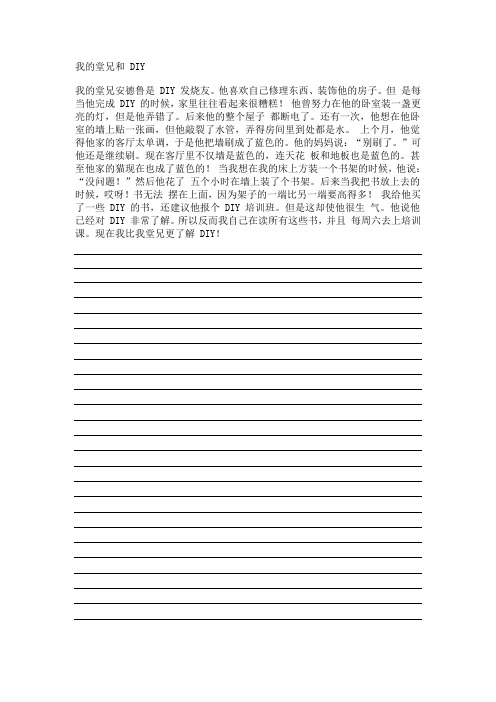
我的堂兄和 DIY
我的堂兄安德鲁是 DIY 发烧友。
他喜欢自己修理东西、装饰他的房子。
但是每当他完成 DIY 的时候,家里往往看起来很糟糕!他曾努力在他的卧室装一盏更亮的灯,但是他弄错了。
后来他的整个屋子都断电了。
还有一次,他想在他卧室的墙上贴一张画,但他敲裂了水管,弄得房间里到处都是水。
上个月,他觉得他家的客厅太单调,于是他把墙刷成了蓝色的。
他的妈妈说:“别刷了。
”可他还是继续刷。
现在客厅里不仅墙是蓝色的,连天花板和地板也是蓝色的。
甚至他家的猫现在也成了蓝色的!当我想在我的床上方装一个书架的时候,他说:“没问题!”然后他花了五个小时在墙上装了个书架。
后来当我把书放上去的时候,哎呀!书无法摆在上面,因为架子的一端比另一端要高得多!我给他买了一些 DIY 的书,还建议他报个 DIY 培训班。
但是这却使他很生气。
他说他已经对 DIY 非常了解。
所以反而我自己在读所有这些书,并且每周六去上培训课。
现在我比我堂兄更了解 DIY!。
牛津译林版8A Unit4 Reading 教案

课题 Unit4主班级姓名学号【教学目标】1. To know some vocabulary about DIY.2. To understand the meaning of the article.3. To lead the students to DIY.【教学重难点】重点:language points难点:【学时安排】一课时【教学方法】reading/ exercises【教学过程】第一段自主学习1.导入新课1. Do you like DIY?2. Have you ever tried DIY? What is it?3. Do you want to take a course in DIY?2.学生自学3.自学检测1 / 104.反馈纠错第二段问题探究5.问题探究问题(一)1. Skim the article, then answer the question: What’s the article mainly about?2. Divide the article into three parts.问题(二)1. Read the article carefully, and underline the difficult words and phrases.问题(三)Read the article again, then tell whether the statements are true or false.6.课堂质疑7.课堂小结第三段当堂检测8.课堂检测一、根据中文或首字母提示写出单词。
1. Builders spent several weeks (to fix something that is damaged,2 / 10broken)the roof and pipe.2.A large bouquet of r arrived on her desk.3.I know this idea sounds (狂热的),but it may be worth a try.4.I (建议) you to think very carefully before making any decision.5.I’m taking a (课程) in graphic design.6.Is it (已经) 5 o’clock?7.Mr.Black is ill ,so he is taking his class i .8.Only 12 people a the meeting.9.I remember (曾经)it snowed on my birthday, and I was so excited.10.There is a light hanging form the (天花板).11.He’s poor at spelling. He made a lot of spelling m in his writing.12.He is a c man. He spends all his money on stamps.13.They makes (管子) for the oil factory.14.I want to take a c in DIY.15.There are some books on the (架子).二、用所给词的适当形式填空。
牛津英语8AUnit 4 Wild animals学案
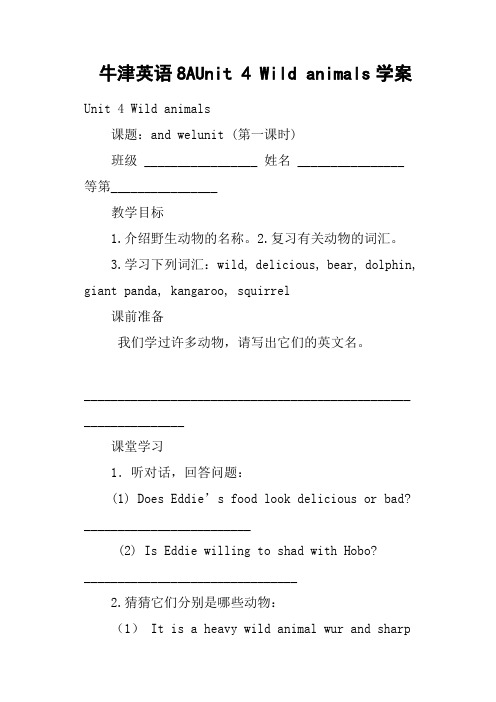
牛津英语8AUnit 4 Wild animals学案Unit 4 Wild animals课题:and welunit (第一课时)班级 _________________ 姓名 ________________ 等第________________教学目标1.介绍野生动物的名称。
2.复习有关动物的词汇。
3.学习下列词汇:wild, delicious, bear, dolphin, giant panda, kangaroo, squirrel课前准备我们学过许多动物,请写出它们的英文名。
_________________________________________________ _______________课堂学习1.听对话,回答问题:(1) Does Eddie’s food look delicious or bad? _________________________(2) Is Eddie willing to shad with Hobo?________________________________2.猜猜它们分别是哪些动物:(1) It is a heavy wild animal wur and sharpclaws. It can walk upward. (直立)(2) It jumps wbabu caAustralia. ______.(3) It liva. Its favoud is bamboo. _______ (4) It is a sea animal and looks like a largIt is very clever andlagauark. ______(5) Iganimal world. It has blabody. ______ (6) It is a small animal with a longail and red, grey or black fur. It eats nuts and liv______对话填空,一空一词。
8A unit4 reading2
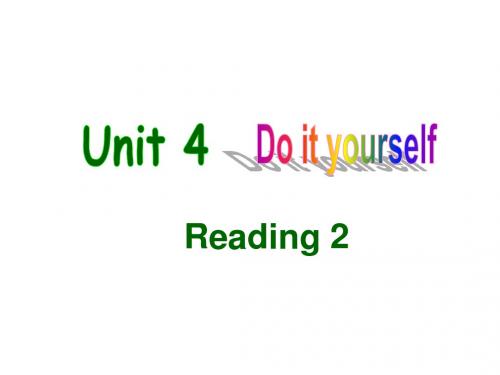
Task 3:Practice
I. 根据汉语提示及句子意思写出单词。
1. It’s acrazy (发疯的) idea. ______ terrible 2. We have just got some _______ (可怕的) news. once 3. Computers are much cheaper nowadays than they _____ (曾经) were. 4. I’vealready (已经) told him. ________ course 5. I’d like to take a writing ______ (课程) when I retire (退休). 6. We’re hoping everyone will ________(出席) the meeting. attend 7. And ______(反而),she ate up all the food on the plate. instead 8.There are many spelling m_______ in your homework. istakes dvises 9.The teacher always a________ the children not to swim in the river. 10. Miss Yangf gave me some ______(advise) on learning English. advice
put相关短语:
扑灭 put out put out the fire put up 张贴/悬挂,搭,竖立 put up a map/a tent / your hands put away: 把(某物)收起来 put them/the books away put on: 穿上;戴上 put on your coat 推迟 put off: put off the meeting
牛津译林版八年级上英语Unit4集体备课表格式教案

牛津译林版八年级上英语Unit4集体备课表格式教案璇?棰?8A Unit 4 Welcome to this unit璇惧瀷New鏁?甯?鍐?瀹??璇?棰?8A Unit 4 Reading (1) 璇惧瀷NewTo learn about vocabulary about DIY.To understand the article and finish relative exercise. To cultivate the sense of DIY.鏁?甯?鍐?瀹??璇?棰?8A Unit 4 Reading (2)璇惧瀷New鏁?甯?鍐?瀹??璇?棰?8A Unit 4 Grammar A 璇惧瀷New鏁?甯?鍐?瀹?? 璇?棰?8A Unit 4 Grammar B璇惧瀷New鏁?甯?鍐?瀹?Step 1 Presentation1. Review Reading to introduce the usage of 鈥渟hould鈥?T: Suzy doesn鈥檛think her cousin knows much about DIY either. What did she advise him to do?T: What do you think she said to him about this?Write this sentence on Bb and mark the word should in red.2. T锛欴o you think we can use had better instead of should in this sentence?Write 鈥淵ou had better take a course in DIY.鈥?Ask ss to think and understand the meaning of the two sentences.3. Present more sentences, encourage ss to sum up the rule: Here are some more sentences. Can you work out when to use should and had better?锛?锛塗o keep fit, you should /had better have a healthy diet.锛?锛塝ou should not /had better not leave litter.锛?锛塈t鈥檚going to rain. You should/had better take an umbrella.4.Work out the rule with ss: We use should and had better when giving advice and telling people what we think is the best or right thing to do. The tone of had better is strong than should.5. Please open your books and turn to page 48. Let鈥檚read the sentencestogether.Step 2 Practice1. T: Suzy is giving DIY advice to her classmates. Can you help her make sentences with should(not) and had better(not)?Have ss do exercise on page 48, and then read and check answers together.2. T: You鈥檙e giving advice to your friends. Rewrite the following sentences using should(not) and had better(not):(1) It鈥檚time for class. Put your comic books away.(You should/had better put your comic books away.)(2锛塝our English is not good enough. Read more to improve it.(You should/had better read more to improve it)(3)Turn your mobile phone off in class.(You should/had better turn your mobile phone off in class.)(4) Don鈥檛make the mistake again.(You should/had better not make the mistake again.)3.T: Boys and girls ,you have learnt how to give advice. I have a problem and I need your help. I can鈥檛sleep well at night and I feel tired during the day. Can you give me some advice?Encourage ss to give advice:You should drink a glass of milk before going to bed./ You should not watch TV just before going to sleep./You had better do some reading before you go to sleep./鈥?4.T: Work in pairs. Talk about your problems and try to give useful advice.Homework1.Preview Grammar2.Finish the relative exercise.?璇?棰?8A Unit 4 Integrated skills 璇惧瀷New鏁?甯?鍐?瀹?A .How to make a fruit saladStep 1 Presentation1. Communicate with ss to lead in new lessons: What did you have forbreakfast/lunch today? What food do you like best? Do you have a healthy diet? Can you cook dinner on your own?2. Present the picture of salad and ask: Look at the picture .This is my favorite food. What is it? Yes, it鈥檚a salad.Write salad on Bb and teach the new words.T: Salad is healthy. Do you like it? Do you think it鈥檚easy to make a salad? Can you make a salad?3. T: What do you need when making a salad?Write spoon and cream on Bb, teach the new words and explain.Step 2 Listening1. T: Open your books and turn to page 49. Look at the pictures in Part A1.T: When we make a salad, we need some tools and we can add anything we like. Canyou name the things in the pictures锛?Write grape and strawberry.2. T: Any and Suzy are making a fruit salad. They鈥檙e talking about what they need. Listen to their conversation and tick the things they need.Play the tape.3. T: Any volunteers? Have a try. The rest of you can check the answers together.If they can鈥檛obtain correct information, play the tape again, pause if necessary.4. T: Amy is making some notes of how to make a fruit salad. Read her notes and put the sentences in the correct order.Play the tape again, ask ss to finish Part A2 on page 49.5. Ask ss to read together and check answers.Step 3 Listening1. T: Amy wants to make a fruit salad. She鈥檚asking Suzy for some tips. Please listen to their conversation and help Amy complete her notes in Part A3 on page 50.2. Ask ss to read together and check answers.B.Speak upStep 4 Activities1. Have a free talk.What do you often have for lunch?Do you like sandwiches for lunch?Sandy and her mum are talking about what to eat for lunch.2. Play the tape.Are sandwiches quick and easy to make ?What do they put on the bread?Do they just need one piece of bread?3. Play the tape and ask ss to repeat after the tape.4. Work in pairs: Work in pairs. It鈥檚your turn to make similar dialogues. Talk about what you can make for lunch. You can use Sandy and her mother鈥檚conversation as a model.Homework1. Memorize words, phrases and sentences.2. Recite Speak up.3. Preview Study skills.?璇?棰?8A Unit 4 Study skills璇惧瀷New鏁?甯?鍐?瀹?Step 1 Presentation1.Show some words on the blackboard old-young easy-hard tall-shortrude/impolite-polite happy-unhappy kind-unkindNow锛寃e know they are prefixes.2.PresentationSay: With some adjectives, we can change the meaning by adding a prefix. Adding the prefixes 鈥渄is鈥? 鈥渋m鈥?鈥渋n鈥?or 鈥渦n鈥?to an adjective will express the opposite meaning of the word. These prefixes mean 鈥渘ot鈥?or 鈥渢he opposite of鈥?e.g. Trainers are comfortable to wear.But small ones are uncomfortable.If someone shows good manners to others, he is a polite person.If someone does not show good manners to others, he is impolite.Step 2 Practice1.Tell the students that 鈥渦n-鈥漣s not the only prefix. There are more prefixes like this. Invite the students to open their book and ask them to match the words on the left with their opposites on the right.1.certain鈥晆ncertain2.important鈥晆nimportant 鈥?2. Show some sentences and fill in the blanks with prefixes.Zhalong is a protected area. It isn鈥檛allowed to hunt or fish there. It is incorrect to kill wild animals. (correct)These trainers are comfortable to wear. But those are uncomfortable. (not comfortable).If someone shows good manners to others, he is a polite person. If someone doesn鈥檛show good manners to others, he is impolite. (not polite )3.Try to pronounce the underlined words銆?1.The boy in this picture is Jake .He often plays with his cat after school.2.Tennis is Lily鈥檚favorite sport .She likes playing tennis with her father.3.What does she look like?She looks slim.4.The girl has a lot of bags in her hand.She is shopping.5.I am a student .I go to school by bus every day.Step 3 Group work鐢ㄥ惁瀹氬墠缂€鐨勫舰瀹硅瘝閫犲彞銆?(1)Water is very important to us.(2) This chair is too small.锛?锛塈have never seen such heavy snow here.锛?锛塗he restaurant is quite near here.锛?锛塈don鈥檛like him because he is rude.Step 4 ExerciseTry to finish the exercises on Page51 and check the answers. usual-unusual possible-impossiblecertain-uncertain tidy-untidy鍐欏嚭涓嬪垪璇嶇殑鍙嶄箟璇?necessary--_________important--_________happy--_________comfortable--_________ friendly--__________ common--_________welcome--__________able--_________ well--__________popular--__________ true--__________ tidy--__________?璇?棰?8A Unit 4 Task璇惧瀷New鏁?甯?鍐?瀹?Step 1 Lead in1.T: We鈥檝e learnt a lot about Suzy鈥檚cousin. He loves DIY very much. What happens every time he does DIY?2.Present more questions,(1) What happen to the cat when Suzy鈥檚finished painting the whole living room blue?(2) Could Suzy put the books on the shelf made by her cousin?(3) Why did Suzy鈥檚cousin feel unhappy when Suzy advised him to take a course in DIY?(4) Is Suzy also weak at DIY?3. T: We know Suzy is good at DIY. Her mother鈥檚birthday is coming. Do you know what he decided to give her mother? Did she do some DIY?Encourage ss to guess the possibility.Step 2 Reading1. T: Suzy made a birthday card at the weekend. Listen to her diary entry carefully and find the answers to these questions.(1) Why didn鈥檛Suzy make the card at home?(Because she wanted to keep it secret.)(2) Did Sandy help?(Yes. Sandy helped her with the drawing.)(3) How long did Suzy and Sandy spend making it?(They spent two hours making it.)(4) What mistakes did Suzy keep making when working on it?(She kept spelling the words wrong because she was too excited.)(5) What colour did she use for the roses?(She coloured them red, blue and pink.)(6) Did they make a mess in the house?(Yes. There was paint on everything.)2. Play the tape.T: Open your books and turn to page 52, please. Let鈥檚repeat after the tape sentence by sentence.3. Ask ss to read the article paragraph by paragraph and think over the content of each paragraph.4. Make ss understand the content of a diary.Para 1: The reason why Suzy made a birthday card.Para 2: How she made the card.Para 3: What happened in the end.Para 3: Suzy鈥檚hope.Step 3 Writing1. Ask ss to turn to page 53, part B.T: Write your own diary entry about one of the DIY jobs you did. Use the diary entry in Part A as a model and use the useful expressions on page 52 to help you. Look at the ideas in Part B. You can choose to write about one of them or use your own ideas.2. Check the composition.Comment on two of their articles.3. Read the sample together.Homework1. Memorize words, phrases and sentences.2. Read and recite the sample writing.精品教案设计资料3. Finish relative exercises.?。
牛津译林版英语八年级上册(初二上学期,8A) Unit 4 Reading 2 (共29张PPT)
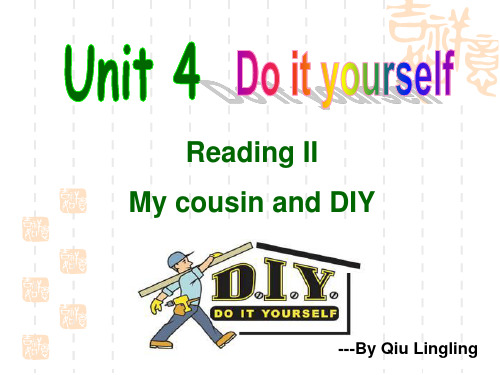
1. It’s raining outside. I have to stay at home to watch TV instead .
2. He walks instead of driving to work to lose weight.
3. Peter’s parents hopes that he can be a doctor instead of a teacher.
Para 3
▪ Last month ,Andrew painted his living room, what happened to his living room?
The living room has not only blue walls but also a blue ceiling and floor.
only… but also”.
▪ ▪ Not only Miss Li but also some students
____li_k_e DIY. = Not only some students but also Miss Li
___li_k_eDs IY.
Rule : “not only… but also” can be used to link subjects. 动词使用就近原则.
in his bedroom
ห้องสมุดไป่ตู้
__h_a_d_a_p_o_w_er__cu_t________.
He _p_ut_u_p_a__p_ic_tu_r_e_______ He _h_it_a_p_i_pe__ and f_il_le_d
on his bedroom wall.
the room _w_i_th__w_a_te_r__.
Unit4DoityourselfWeletotheunitReading知识点详解牛津译林版八年级

8A Unit 4 Do it yourself Wele to the unitReading知识点详解Wele to the unit1. Here are clear instructions. 这里有清楚的说明。
instruction作名词,意为“说明,命令,指示”。
Please read the instructions carefully before you take medicine.He followed the instruction to walk along a certain street where I picked him up.【举一反三】1. Could you show me the method of cooking the tasty cookie?Please follow the _____on the cookbook.A. directionB. attentionC. instructionD. introduction2. —How did you put together the model ship so perfectly? —It’s easy. I just followed the ________.A. informationB. messagesC. notesD. instructions2. You’d better get some tools. 你最好准备一些工具。
had better意为“最好...”(= ’d better) ,后面跟动词原形,表示提建议,其否定形式是直接在had better后面加not,意为“最好不要...”,had better无人称和数的变化。
had better (not) do sth.You’d better hurry, or you’ll miss the train.We had better go before it rains.【举一反三】1.You had better ______ (not talk) loudly. The baby is sleeping.2. I have a bad cold, mom. Oh, dear! You had better______ a doctor with me in a minute.A. will seeB. seeC. not seeD. seeing3. It says, “Do it yourself.” 它写着:“你自己动手。
8A Unit 4 Wild animals Reading 教学设计
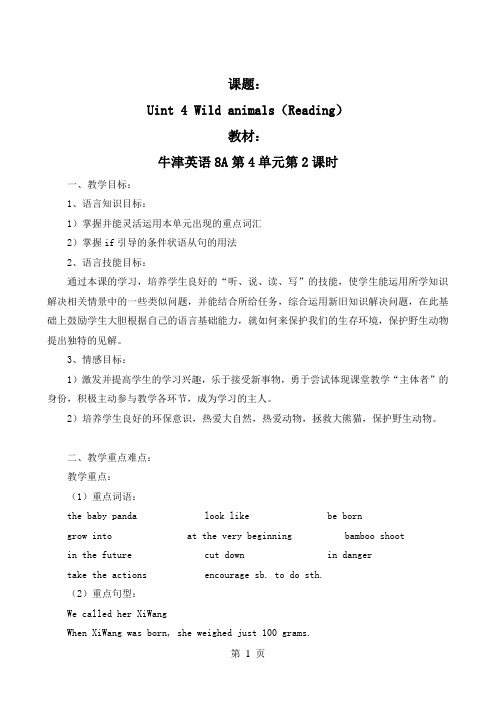
课题:Uint 4 Wild animals(Reading)教材:牛津英语8A第4单元第2课时一、教学目标:1、语言知识目标:1)掌握并能灵活运用本单元出现的重点词汇2)掌握if引导的条件状语从句的用法2、语言技能目标:通过本课的学习,培养学生良好的“听、说、读、写”的技能,使学生能运用所学知识解决相关情景中的一些类似问题,并能结合所给任务,综合运用新旧知识解决问题,在此基础上鼓励学生大胆根据自己的语言基础能力,就如何来保护我们的生存环境,保护野生动物提出独特的见解。
3、情感目标:1)激发并提高学生的学习兴趣,乐于接受新事物,勇于尝试体现课堂教学“主体者”的身份,积极主动参与教学各环节,成为学习的主人。
2)培养学生良好的环保意识,热爱大自然,热爱动物,拯救大熊猫,保护野生动物。
二、教学重点难点:教学重点:(1)重点词语:the baby panda look like be borngrow into at the very beginning bamboo shootin the future cut down in dangertake the actions encourage sb. to do sth.(2)重点句型:We called her XiWangWhen XiWang was born, she weighed just 100 grams.XiWang drank her mother’s milk for up to 14 hours a day.Sadly, it is very difficult for giant pandas to survive in the wild.(3)重点语法:if引导的条件状语从句教学难点:(1)讨论如何采取措施保护我们的生态环境?(2)给有关部门写一封信,呼吁全社会保护自然生态环境,爱护野生动物,全社会一起来抓好。
三、教学方法与教学手段:教学方法:小组讨论法任务驱动法情景教学法教学手段:图片多媒体录音机四、教学过程:StepⅠ Warming-upT: I’ve a wonderful song, would you like to share it with me ?(课前播放一首英文歌曲,渲染课堂气氛,营造英语学习氛围,使学生很快进入角色)T: Boys and girls, shall we begin our class now? We know everyone has many friends and we also have many animal friends. I think animals are usually very friendly to us , we should love them and protect them. If the animals live in the wild , we can call them wild animals. Now , look at the screen ,can you tell me what they are?(设计说明:用学生熟知的话题导入,能引起学生的共鸣,吸引学生主动参与,积极思索,学生纷纷举手说出了多媒体屏幕上展出的野生动物的名称)Step Ⅱ. Pre-readingT: Can you tell me which is your favourite wild animal?And can you tell me which is my favourite wild animal?(学生说出了自己和老师所喜欢的野生动物名称,以及喜欢的原因,从而达到了人人动脑,积极表演,反复操练,复习以前所学过的动物名称,激起了学生的表现欲,活跃了课堂气氛)(学生在猜测老师所喜欢的野生动物的过程中,若有人提到了大熊猫,就将大熊猫的图片展示出来)T: Do you know why I like giant pandas best ? Because giant pandas are very lovely. They look like white mice when they were born. They look like bears when they grow up. They are friendly , too. They like eating bamboo leaves and shoots. They seldom eat meat or hurt other animals. But it’s a pity that there are not many giant pandas in the world .The number of the pandas is less than 1000.They’re in danger . Hunters catch them and kill them for their fur . And farmers cut down trees and forests. So they have nowhere to live. We should take actions to protect them. In our country ,there are some reserves for pandas. One of them is Wolong reserve.(教师边讲,边显示出屏幕上的相关图片,并通过图片来进行单词、词组的教学,同时把这些词汇写在黑板上,带领学生朗读这些词汇。
最新深圳牛津版八年级英语优质课件 8A Unit 4 Great inventions Reading
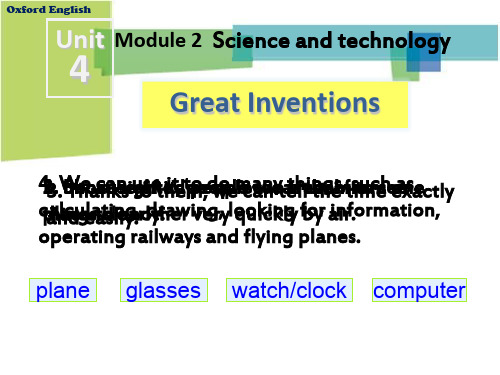
• Wyohuerngrwoauspi.t invented? 2.• HCohwoohseasthitecmhaonsgteindtpeereosptlien’gs olifnee?in
• Wyohuartgdroouypo.u think of it? 3. The winners present in front of our
class.
homework
• 1. Use your own way to help yourself retell the other two paragraphs.
3 Which invention is probably the greatest in history according to the article? The wheel.
4 What did Alexander Graham Bell invent? He invented one of the first practical telephones.
Use the ways we learn to introduce our favourite inventions with details.
Great Inventions around us
GW (2m): Look around our classroom.
What great inventions can you find?
Life after its invention
People can do as many things in the evening as they can in the daytime.
8A Unit 4 Reading II 教案1
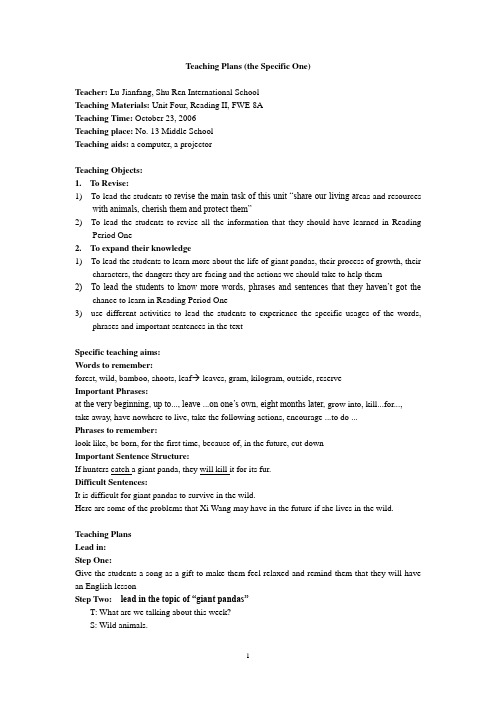
Teaching Plans (the Specific One)Teacher: Lu Jianfang, Shu Ren International SchoolTeaching Materials: Unit Four, Reading II, FWE 8ATeaching Time: October 23, 2006Teaching place: No. 13 Middle SchoolTeaching aids: a computer, a projectorTeaching Objects:1.To Revise:1) To lead the students t o revise the main task of this unit “share our living ar eas and resourceswith animals, cherish them and protect them”2) To lead the students to revise all the information that they should have learned in ReadingPeriod One2. To expand their knowledge1) To lead the students to learn more about the life of giant pandas, their process of growth, theircharacters, the dangers they are facing and the actions we should take to help them2) To lead the students to know more words, phrases and sentences that they haven’t got thechance to learn in Reading Period One3) use different activities to lead the students to experience the specific usages of the words,phrases and important sentences in the textSpecific teaching aims:Words to remember:forest, wild, bamboo, shoots, leaf leaves, gram, kilogram, outside, reserveImportant Phrases:at the very beginning, up to..., leave ...on one’s own, eight months later, grow into, kill...for..., take away, have nowhere to live, take the following actions, encourage ...to do ...Phrases to remember:look like, be born, for the first time, because of, in the future, cut downImportant Sentence Structure:If hunters catch a giant panda, they will kill it for its fur.Difficult Sentences:It is difficult for giant pandas to survive in the wild.Here are some of the problems that Xi Wang may have in the future if she lives in the wild.Teaching PlansLead in:Step One:Give the students a song as a gift to make them feel relaxed and remind them that they will have an English lessonStep Two: lead in the topic of “giant pandas”T: What are we talking about this week?S: Wild animals.T: What is your favorite animal?S: ...T: Can you guess what my favorite animal is?S: ...T: Giant pandas. (showing them a doll panda)Step Three: Lead in the revision of readingT: OK. Let’s start our lesson.(an E-mail appears on the screen)T: Oh, what is this?S: An e-mail.T: Who sent the e-mail to me?S: Wolong giant panda reserve.T: What did it say?S: Would you like to join our club?T: Would you?S: Yes, I’d love to.four levels appear on the screen→ lead the students to read themT: Oh, you have four levels to pass. Do you want to have a try?S: Yes.T: Now, let’s go.Practice: use four steps to revise all the information of Xi Wang and lead in specific usage of words and phrases1.the growth of Xi Wang2.the characters of Xi Wang3.the dangers that she is facing4.the actions that people should take to helpStep One:Level one (the growth of Xi Wang) → to revise important words in reading and use more exercises to lead the students to practice using them1.1) 10 days old:show a picture of a baby panda →the usage of “gram”T: How much did she weigh?S: She weighed 100 grams.2) at four months oldshow a picture of a panda at about four months old → the usage of “ kilogram”T: How much did she weigh?S: She weighed 10 kilograms.use super link to link to the exercises of “gram, kilogram”1 kilogram = _________ grams (1000)A 12-month-old panda weighs about 35 __________. (kilograms, grams) (kilograms)2) show a picture of a panda at about four moths old, staying outside in the wild → the usage of“ outside”T: What did she start to do?S: She started to go outside her home.use super link to link to the exercises of “outside”Giant panda reserves are always _______ the city.A. insideB. outsideC. onD. in (B)2.at six months old1) show a picture of a panda at about six months old -> the usage of “bamboo shoots and leaves”T: What did she start to eat?S: She started to eat bamboo shoots and leaves.use super link to link to the exercises of “bamboo shoots and leaves”A six-month-old panda eats b________ s_________.A 20-month-old panda likes bamboo _______ (leaf) better. (leaves)2)show a picture of a panda sitting in a forest →the usage of “forest, reserve”T: Where can giant pandas get bamboo shoots and leaves?S: In a forest.T: Where can they find a forest?S: In a panda reserve.use super link to link to the exercises of “forest, reserve”three pictures appear on the screenWhich is a forest? (C)T: What about the second one?S: It is the wild.T: Do you know any panda reserves?S: Yes. Wolong Panda Reserve.e pictures to practice reading those words we have just revisedStep Two:Level two (characters of Xi Wang) → to revise the usage of important phrases1.show a picture of a baby panda drinking her mother’s milk →“at the very beginning”T: When did she start to drink her mother’s milk?S: At the very beginning.use super link to link to the exercises of “at the very beginning”在一开始的时候, 熊猫看上去像是只白老鼠._____________________, the baby panda looked like a white mouse. (At the very beginning) 2.lead in the usage of “up to”T: How long did she drink her mother’s milk a day?S: For up to 14 hours a day.use super link to link to the exe rcises of “up to”What does “up to” mean?(B)A. at leastB. as many asC. aboutD. more thanpare two pictures to lead in the usage of “leave, leave ...on one’s own”T: Look at these pictures carefully, can you find the difference?S: ...T: Who is with Xi Wang in the first picture?S: Her friends. Her mother.T: Her mother. But where is she in the second picture?S: She left Xi Wang because she had another baby.T: So leave→ left.T: Yes, her mother left her for two whole days on her own.use super link to link to the usage of “leave, leave ...on one’s own”What does “leave” mean in each of the two sentences?离开→让某人独处pare four pictures to lead in the usage of “grow, grow up, grow into”T: Look at the screen carefully. What happened?S: She grew into a healthy young giant panda.use super link to link to the usage of “grow, grow up, grow into”Xi Wang _______ (grow) quickly.Soon she has ________(grown up, grown into).Now she has ________(grown up, grown into) a healthy young giant panda.(grows, grown up, grown into)5. use an extra exercise to give a conclusion of what we have learned in level twoask the students to finish the extra exercises one (use the following phrases to fill in the blanks) on students learning aidsFill in the blanks with the correct phrases:20 months later, grow into, at the very beginning, up to, leave ...on one’s own1). During Xi Wang’s childhood, she drank her mother’s milk for _______four months.2). It is difficult for pandas to ________ a healthy young panda because of too many hunters.3). ___________________, Xi Wang was very small and weak.4). ___________________, her mother had another baby so she had to look after herself.5). Mother pandas like to _____their children ____________when they are 20 months old.Step Three:Level three (pandas’ dangers and actions)→ to revise the left parts of important phrases and the sentence structure “if sb. do/does..., sb will do....”1. T: If hunters catch a giant panda, what will they do?S: If hunters catch a giant panda, they will kill it for its fur.practice “if” clause, using “ if farmers cut down trees and forests,if people find baby pandas alone,”e pictures to revise the phrases “kill...for..., have nowhere to live”and “if” clauseTwo pictures of hunters killing pandas for their fur appear on the screenT: Oh, what happened again? Two pictures. I am near-sighted. Can you describe them for me? S: If hunters catch giant pandas, they will kill them for their fur.Another two pictures showing the fact that pandas have nowhere to live appear on the screen T: What about these two pictures?S: If farmers cut down trees and forests, giant pandas will have nowhere to live.e a song to lead in other problems that pandas are facingT: Do you know any other problems that pandas are facing?S: ...show the students a song to lead in the problem of “ flowers on bamboos’ coming out”T: What problems can you find?S: Flowers on bamboos come out.T: If flowers on bamboos come out, pandas will have nothing to eat.T: If we do nothing, what will happen?S: If we do nothing, soon there will be no giant pandas in the world.4.lead in the actions we can take to protect pandas lead in the phrases “ encourage...to do ...”T: So what actions can we take to help pandas?S: We can encourage farmers to leave the reserves.T: What other actions can you take to protect pandas?S: ...T: What is the best one?S: ...T: We should encourage more people to join our club.You can e-mail us at Wolong@5.practice reading the words and phrases we have learned just nowStep Four:Level four ( to be a good reporter)1. there are some other useful phrases in the passage which are important but with no need to explain their usages. So we lead the students to find those phrases and underline them2. there are two important sentences in the passage, lead the students to find them and learn totranslate them into ChineseIt is difficult for giants pandas to survive in the wild. 对大熊猫来说生存在野外很困难.Here are some of the problems that Xi Wang may have in the future if she lives in the wild.以下是希望将来的野外生存中会遇到的麻烦.4.lead the students to read the words and phrases on the blackboardkilogram outsideleaf leaves survive forest action protect reserve look likebe bornfor the first timegrow intobamboo shoots and leaves in the futureleave ...on one’s own encourage ...to do ...T: Do you want to be a reporter when you grow up?S: Yes.T: Would you like to be a good reporter for giant pandas?You know, pronunciation is very important for a good reporter. Do you think so?S: Yes.T: So now let’s read these words and phrases after me.4. lead them to read the text with the tapeFollow ups: show time:tell students rules and give them key wordsTopics: 话题1. The growth of pandasbe born, gram, at four months old, kilograms, eight months later, grow into, up to, bamboo shoots and leaves2. the dangers they havehunters, kill...for..., farmers, have nowhere to live, take away,3. the actions we should taketake the following actions, encourage...to do ...Rules: 规则1.Students in Line 1&2 talk about the first topic2.Students in Line 3&4 talk about the second topic3.Students in Line 5&6 talk about the third topic4.Work in groups of four5.Choose one of you to talk about that topicSum up: Finish doing Part D on page 62, unit four FWEgive them a certificate of joining the club and give them a gift which is the exercises Part D on the textbookHomework:Finish exercises on page 59-60Read the text twiceSurf on the internet to find more information about pandasPostscript:1. The using of “an e-mail from Wolong Panda Reserve” to combine the whole teaching is useful.2. The using of “teaching the specific usages of words, phrases and sentence structures by revising the life of Xi Wang” is useful.3. It is bette r to choose another song named “heal the world” to lead in the topic “we should protect animals and the world”.4. It is better to divide the class into teams and lead them to compete and thus the learning atmosphere will be better.Blackboard Designkilogram outsideleaf leaves survive forest action protect reserve look likebe bornfor the first timegrow intobamboo shoots and leaves in the futureleave ...on one’s own encourage ...to do ...Students’ Learning AidsTeaching Aims:教学目标Words: forest, wild, bamboo, shoots, leaf leaves, gram, kilogram, outside, reserveImportant Phrases: at the very beginning, up to..., leave ...on one’s own, eight months later, grow into, kill...for..., take away, have nowhere to live, take the following actions,encourage ...to do ...Other Phrases: look like, be born, for the first time, because of, in the future, cut down Important Sentence Structure:If hunters catch a giant panda, they will kill it for its fur.Difficult Sentences:It is difficult for giant pandas to survive in the wild.Here are some of the problems that Xi Wang may have in the future if she lives in the wild.Main Task:情感目标arouse students’ love for giant pandas and thus try their best to help giant pandasExtra Exercises:1.Fill in the blanks with the correct phrases:20 months later, grow into, at the very beginning, up to, leave ...on one’s own1). During Xi Wang’s childhood, she drank her mother’s milk for _______four months.2). It is difficult for pandas to ________ a healthy young panda because of too many hunters.3). ___________________, Xi Wang was very small and weak.4). ___________________, her mother had another baby so she had to look after herself.5). Mother pandas like to _____their children ____________when they are 20 months old.2. Show TimeLevel Four: to be a good reporter for giant pandasTopics: 话题1. The growth of pandasbe born, gram, at four months old, kilograms, eight months later, grow into, up to, bamboo shoots and leaves2. the dangers they havehunters, kill...for..., farmers, have nowhere to live, take away,3. the actions we should taketake the following actions, encourage...to do ...Rules: 规则1.Students in Line 1&2 talk about the first topic2.Students in Line 3&4 talk about the second topic3.Students in Line 5&6 talk about the third topic4.Work in groups of four5.Choose one of you to talk about that topic。
译林牛津初中英语8AUnit 4 Reading My cousin and DIY
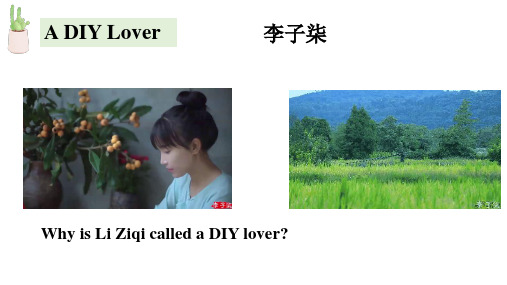
Para. 5
My cousin and DIY
Introduction
What kind of DIY work does Andrew do? He loves to repair things and decorate his house.
Let’s decorate a house!
put in a bright light 安装 ceiling/ˈsiːlɪŋ/ 天花板 paint the wall white put up some pictures 张贴 put up a book shelf 挂起
about DIY”
Now Suzy knows more about WDIhYo nkonwow. s more about DIY now?
请输入标题
A DIY “Lover”
请输入标题
A DIY “Lover”
? A DIY “Lover” 请输A入D标IY题Lover
? A DIY “Lover” 请A输D入IY标题Lover
2. Why did his Mum say so? How did his Mum feel when she heard Andrew wanted to paint the room blue?
3. How to read “Stop it”?
A DIY “Lover” 请输入标题
Think:
A DIY “Lover” 请输入标题
Andrew’s DIY stories Please read Para. 2 to Para.4!
Para 2 Para 3 Para 4
A DIY “Lover”
1. What did his Mum say when Andrew wanted to paint his house blue? Stop it.
仁爱版英语八年级上册8A_Unit4_Topic2_SectionB_随堂练习(含答案)
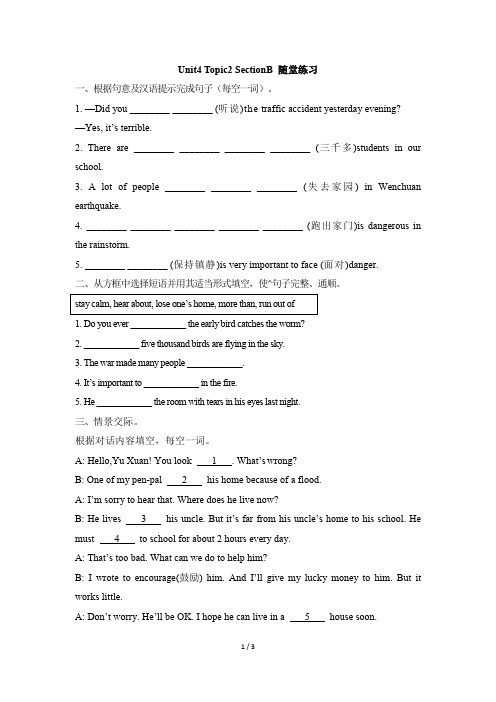
Unit4 Topic2 SectionB 随堂练习一、根据句意及汉语提示完成句子(每空一词)。
1. —Did you ________ ________ (听说)the traffic accident yesterday evening? —Yes, it’s terrible.2. There are ________ ________ ________ ________ (三千多)students in our school.3. A lot of people ________ ________ ________ (失去家园) in Wenchuan earthquake.4. ________ ________ ________ ________ ________ (跑出家门)is dangerous in the rainstorm.5. ________ ________ (保持镇静)is very important to face (面对)danger.二、从方框中选择短语并用其适当形式填空,使^句子完整、通顺。
1. Do you ever ____________ the early bird catches the worm?2. ____________ five thousand birds are flying in the sky.3. The war made many people ____________.4. It’s important to ____________ in the fire.5. He ____________ the room with tears in his eyes last night.三、情景交际。
根据对话内容填空,每空一词。
A: Hello,Yu Xuan! You look 1 . What’s wrong?B: One of my pen-pal 2 his home because of a flood.A: I’m sorry to hear that. Where does he live now?B: He lives 3 his uncle. But it’s far from his uncle’s home to his s chool. He must 4 to school for about 2 hours every day.A: That’s too bad. What can we do to help him?B: I wrote to encourage(鼓励) him. And I’ll give my lucky money to him. But it works little.A: Don’t worry. He’ll be OK. I hope he can live in a 5 house soon.B: Me,too. Thank you.1. 2. 3. 4. 5.参考答案一、1. hear about2. more than three thousand3. lost their homes4. Running out of the door5. Staying calm二、1. hear about2. More than3. lost their homes4. stay calm5. ran out of 三、1. sad2. lost3. with4. walk5. new。
- 1、下载文档前请自行甄别文档内容的完整性,平台不提供额外的编辑、内容补充、找答案等附加服务。
- 2、"仅部分预览"的文档,不可在线预览部分如存在完整性等问题,可反馈申请退款(可完整预览的文档不适用该条件!)。
- 3、如文档侵犯您的权益,请联系客服反馈,我们会尽快为您处理(人工客服工作时间:9:00-18:30)。
I. 根据汉语提示及句子意思写出单词。 crazy (发疯的) idea. 1. It’s a ______ terrible (可怕的) 2. We have just got some _______ news. 3. Computers are much cheaper nowadays than they _____ once (曾经) were. already (已经) told him. 4. I’ve ________ course (课程) 5. I’d like to take a writing ______ when I retire (退休). attend 6. We’re hoping everyone will ______ (出席) the meeting.
3. Another time, he wanted to put up a picture on his bedroom wall, but he hit a pipe and filled the room with water.
fill … with … 用……填充……(强调动作) 杰克在口袋里塞满了糖果。 Jack filled his pockets with sweets. 他在玻璃杯里盛满了水。 He filled the glass with water. be full of(强调状态) The glass is full of water.
2. He once tried to put in a brighter light in his bedroom, but he made a mistake. try (one’s best) to do sth. 尽力做某事 try doing sth. 尝试做某事 我尽力要把英语学好。 I'm trying to learn English well. 这只猫正尝试着用爪子打开这扇门。 The cat is trying opening the door with its paws.
6. I bought some books about DIY for him and I also advised him to take a course in DIY. advise sb. to do sth. 建议某人做某事 advise sb. not to do sth. 我建议他们早些出发。 I advise them to start early. 医生建议我少吃多运动。 The doctor advises me to eat less and exercise more. 老师建议我不要在课堂上讲话。 The teacher advised me not to talk in class.
1. My cousin Andrew is crazy about DIY. be crazy about 对……着迷 Tom对小动物着了迷。 Tom is crazy about small animals. 我对修理电脑着迷。 I am crazy about repairing computers. 我弟弟小的时候对骑车很着迷。 My brother was crazy about riding a bike when he was very young.
put up a picture
fill … with paint the wall blue keep on doing sth. not only … but also
8. 用…填充
12. 一个…另一个
one … the other
13. 给某人买某物
Suzy bought some books about DIY for Andrew and also advised him to take a course in DIY. But this made him angry . He says he knows everythingabout it. So instead , Suzy is reading the books and attending lessons every Saturday . Now Suzy knows much more about DIY than Andrew.
He painted the walls in the living room blue.
He painted the ceiling, the floor and his cat blue.
The books couldn’t stay He put up a shelf for Suzy there because one end of the shelf was much higher than the other.
buy sb. sth.
buy sth. for sb.
14. 建议某人做某事 15. 上DIY课程 16. 让他发怒 17. 了解一切 18. 上课 19. 知道得多得多
advise sb. to do sth. take a course in DIY make him angry know everything about sth. attend lessons know much more about
1. 对……着迷 2. 看起来很糟糕
be …crazy about
look terrible
put in
3. 安装
4. 犯错误 5. 他的整座房子 6. 断电 7. 贴一张画
make a mistake / make mistakes
his whole house have a power cut
When I wanted a shelf above my bed, He spent five hours putting up it on the wall. But I found that the books couldn’t stay there because one end of the shelf higher than the other . was much
Andrew is crazy about DIY. He loves to repair things and decorate his house. But when he finishes , the house looks terrible . He once tried to put in a brighter light in his bedroom but he made a mistake . Then the whole house had put up a power cut . Another Time he wanted to a pipe and filled the picture on the wall, but he hit a room with water. Last month, he thought the living room was boring So he painted it blue . Now it has not only blue floor . walls but also a blue ceiling and .
III. 单项选择。 1. — Allen, your bedroom is in a mess (乱七八糟). — Sorry, Mum I’ll ______ my things at once. A. put on B. put away C. put out D. put up
2. — Excuse me, Sir. But smoking is not allowed here. — Sorry, I didn’t see the sign. I’ll ______ my cigarette at once. A. put out B. put away C. put up D. put off 3. It’s cold outside. You’d better ______ your coat and scarf. A. work out B. put out C. have on D. put on
1. 我建议他放学后多读英语。 2. 我努力打开了窗户。 3. 下次不要在作业中犯那么多的错误。 4. 她总是问我相同的问题。 5. Mr Li 不但会弹钢琴,而且会拉小提琴。 6. 这个老头很迷老爷车。 7. 这个女孩给杯子里装满了牛奶。 8. 你想把你的房间涂成绿色吗? 9. 在河的一边有很多树,在另一边有很多花。 10. 老师建议我们不要看太多电视。 11. 他说的话惹恼了我。 12. 去年我参加了一个写作班。
put相关短语: put out 扑灭 Later some firemen came and put out the fire. (七年级下册 P82) put up 搭,竖立,张贴 We put up our tent near a lake. (七年级下册 P74) put in 安装 He once tried to put in a brighter light in his bedroom, but he made a mistake. (八年级上册 P44)
4. The 3D Titanic is a moving film. My parents have seen it twice _______. A. yet B. already C. never D. almost 5. — The box is too heavy to carry. What’s in it? — Oh, it is _______ books. A. filled with B. covered with C. used for D. asked for
make a mistake 犯错误
Tom 很粗心,所以他在作业中犯了很多错 误。 Tom is very careless so he made a lot of mistakes in his homework. 你越仔细,你犯的错误就越少。 The more careful you are, the fewer mistakes you will make.
